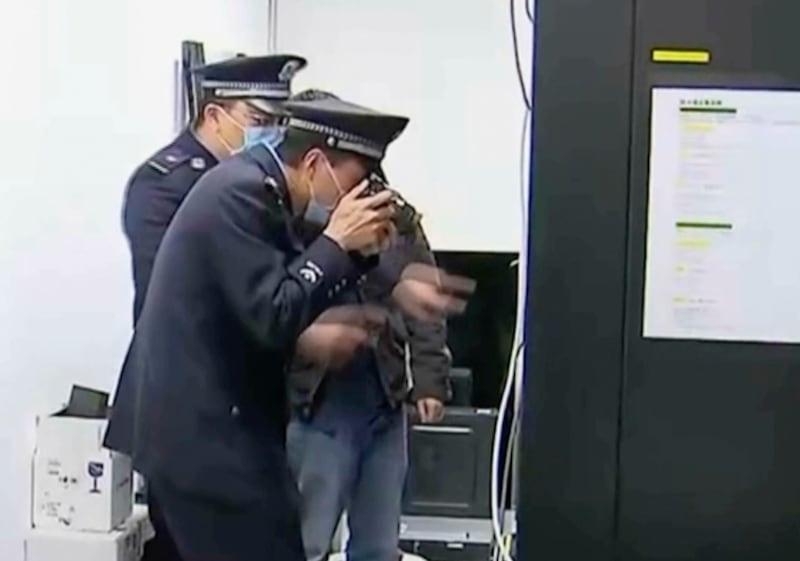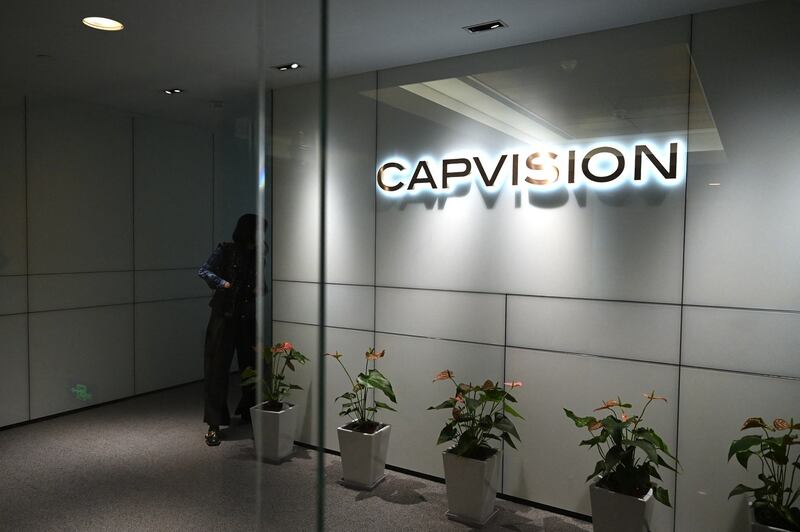China state security police raided the offices of Suzhou-based Capvision as part of an investigation into alleged “espionage” at the high-profile consultancy firm, Chinese financial media reported on Wednesday.
Just days after similar raids targeting foreign consultancy firms, police have accused Capvision of “facilitating the leaking of state secrets,” raided its offices and questioned its employees in Shanghai, Beijing, Suzhou and Shenzhen, according to Jiangsu’s state-run provincial TV station.
Police told the broadcaster that Capvision had been in “regular contact” with people working in sensitive industries like defense and science, and that the company had paid huge salaries to such people in a bid to “illegally obtain all kinds of nationally sensitive data.”
“The state security bureau of Suzhou city ... together with the Municipal Market Supervision Administration and the Municipal Statistics Bureau launched a joint law enforcement action against the Suzhou branch of the consulting company Capvision ... which is suspected of endangering national security,” Sina.com’s finance channel reported.
The raid comes after China's rubber-stamp parliament, the National People's Congress, revised its counter-espionage law last month to broaden the definition of spying to include "sharing documents, data, materials and items related to national security and interests."

The Chinese authorities have typically employed a highly elastic definition of what constitutes a state secret, and national security charges are frequently leveled at journalists, rights lawyers and activists, often based on material they posted online.
Capvision was founded by a former employee of the U.S. management consultancy Bain & Co., which also received a visit from police in Shanghai last month, following a raid on U.S. due diligence firm Mintz in March. The U.S. Chamber of Commerce warned in April that the risks of doing business in China are rising.
The company said via its official WeChat account on Monday that it would “resolutely implement” its response to national security developments, pledging to step up its self-regulation, according to FX168 Financial News (Hong Kong) News.
A warning signal
Citing the company’s own prospectus, Sina.com said the number of “experts” working with Capvision rose from 230,000 at the end of 2018 to 395,000 in the third quarter of 2021.
“Capvision undoubtedly played an important role in [a] wave of incidents endangering national security,” the report said, citing state security police.
“When experts refuse to answer, Capvision would incite them to answer sensitive questions by increasing their fee,” it said. “It also told experts that they can use examples, analogies and other flexible methods to answer sensitive questions obliquely.”
The company also introduced clauses into consultant contracts shifting responsibility for sensitive data onto their contractors, the report said.
“The experts were attracted by the generous fees offered ... and leaked internal sensitive content and even state secrets and intelligence to foreign-linked consultants, taking them down the path of illegal and criminal actions,” Sina.com quoted police sources as saying.
Independent current affairs commentator Ji Feng said the move is a warning signal to Western companies and organizations operating in China.
“First, they want to frighten ordinary people, but they also want to send a reminder to Western countries ... it’s a bargaining chip in [China’s strategic] games with the West,” Ji said.

Commentator Zhang Shengqi said leaks do occur from sensitive areas of government and the economy, often from retirees from companies with military links.
“There are military-linked technology companies in the system, and they sell their tech for a profit,” Zhang said. “They form cooperative relationships and will do anything to find overseas buyers.”
“When I was in Beijing, I saw these veteran officials looking for buyers, saying that they had stolen these technologies from the United States via declassification and military tech making the transition to civilian use,” he said. “These technology products were originally stolen from the West, and they were selling them to countries that are less developed than China.”
Control over economic information
Veteran current affairs commentator Ma Ju said the authorities are also targeting consulting firms because they are sources of fairly reliable economic data, and the ruling Chinese Communist Party wants total control over the flow of information about the economy.
“These consulting companies have branches all over the world, and they have been fine in China for so many years, yet suddenly they have become problematic,” Ma said. “I believe everyone who understands the Chinese system knows very well [what is happening].”
Eric Zheng, president of the American Chamber of Commerce in Shanghai, called on authorities to “more clearly delineate” which areas of due diligence were permissible.
“Without proper due diligence, foreign companies will be unable to invest in new projects in China,” he said in comments quoted by Reuters on Tuesday.
Foreign Ministry spokesman Wang Wenbin said the raid on Capvision was part of “normal law enforcement.”
“Recently, Chinese national security authorities and departments concerned have jointly taken public law enforcement actions on the company mentioned,” Wang said.
“These are normal law enforcement actions consistent with Chinese laws that aim to promote sound and well-regulated growth of [the] sector and safeguard national security and development interests.”
Translated by Luisetta Mudie. Edited by Matt Reed.
